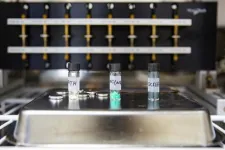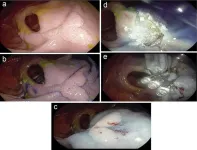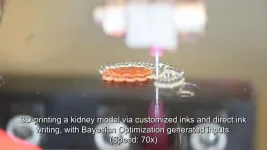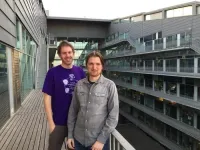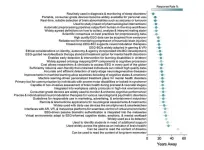(Press-News.org) DALLAS, August 22, 2024 — A new $20 million research initiative will engage the people most impacted by health disparities in developing solutions that may help improve their overall health and well-being. The American Heart Association, celebrating 100 years of lifesaving service as the world’s leading nonprofit organization focused on heart and brain health for all, and the Robert Wood Johnson Foundation (RWJF), a leading national philanthropy dedicated to taking bold leaps to transform health, are funding four research grants to foster collaboration between research scientists and community leaders to develop community-driven research projects aimed at improving health and saving lives.
The American Heart Association’s Health Equity Research Network (HERN) on Community-Driven Research Approaches will bring together teams of scientists from Furman University, Yale University and the University of California-San Diego to work collaboratively on research projects with community-based organizations in California, New York and South Carolina. A team from the University of Texas Health Science Center at San Antonio will serve as the community engagement resource center for the network, leveraging expertise for training across network sites and nationally, providing consultation and guidance, compiling data reports and coordinating the administration of the initiative.
“This new innovative research network aligns with the American Heart Association’s multi-pronged approach to advance cardiovascular health for all, including identifying and removing barriers to health care access and quality, increasing equity, diversity and inclusion in science and fostering more diverse research,” said Keith Churchwell, M.D., FAHA, 2024-25 volunteer president of the Association and chair of the volunteer writing committee for the organization’s 2020 seminal presidential advisory on health disparities. “These networks are designed to identify ways to aggressively address adverse social determinants of health while engaging the very people who are most impacted in improving their individual and community health.”
“This initiative exemplifies our joint commitment to advancing health equity by harnessing the power of community-driven research,” said Alonzo L. Plough, Ph.D., M.P.H., RWJF Vice-president, Research-Evaluation-Learning and Chief Science Officer. “By working together with the communities most affected by health inequities, we are supporting innovative changes in conventional clinical research that better address health equity. We believe this collaborative effort will improve health outcomes, build a foundation of trust in the research process and contribute knowledge essential to achieving a future where health is no longer a privilege, but a right. "
COmmuNity eNgagEment for building Capacity, Trust, and Ownership of Research (CONNECTOR) is the name of the community engagement resource center managed by a team from The University of Texas Health Science Center at San Antonio. This team will be led by Vasan Ramachandran, M.D., FAHA, professor and founding dean of the University of Texas School of Public Health San Antonio and the Frank Harrison, M.D., Ph.D. distinguished chair in public health. Key activities will include supporting the network teams to identify, evaluate and manage community-based solutions for fighting heart disease that match what people think they need and are willing to support to bring about local changes for better health. This will include training the next generation of students on how they can work in communities and learn from and with the people in those communities to bring about change. Additionally, the team will share key learnings of the research projects.
The three targeted research projects, which began on July 1 and run for five years, include:
Advancing Food Justice Through Partnered Community-Driven Research - University of California San Diego and YMCA of San Diego County: This team will be led by Cheryl A.M. Anderson, Ph.D., M.P.H., M.S., FAHA, a professor and dean of the Herbert Wertheim School of Public Health and Human Longevity Science at UC San Diego and Earl M. Felisme, Tri- Chair for the San Diego Childhood Obesity Initiative Community Council. The theme of their work is “flipping paradigms”. This team will re-imagine and re-orient the ways in which resources, information and wisdom flow between communities, academia and other institutions. They will advance food justice – the belief that everyone should have access to healthy and sustainable food - in California’s San Diego County through three core programs: a community-led granting program that funds community priorities; an academic-led scientific methods program to support community-led grants; and a postdoctoral training program. The struggle of not eating enough nutritious high-quality food, coupled with concerns related to economics, environment, housing, education, safety and discrimination can lead to poor health outcomes. The team’s vision is that everyone, everywhere will eat healthful diets and achieve cardiovascular health through research and collective action work that is community-driven, diverse and inclusive.
JUSTResearch, FamJUSTICE and InJUSTICE - Yale University SEICHE Center for Health and Justice and JustLeadershipUSA: This team will be led by Emily Wang, M.D., M.A.S., a professor of medicine and public health at Yale University and director of the SEICHE Center for Health and Justice and DeAnna Hoskins, M.A., the president and CEO of JustLeadershipUSA, a national organization based in New York. This team will explore why people who are incarcerated, along with their family members, are likely to have an increased risk of poor health, especially poor heart health. They will work with individuals who are formerly incarcerated to design research projects to identify health and wellness barriers. The team will collect data to determine what health risk factors may be most prevalent among people in prison and their family members and what types of interventions might be most successful in improving their health. The team plans to develop protocols and practices for a toolkit that can be used by community-academic partnerships to engage people impacted by mass incarceration in future research.
Amplifying Community Power in the Research to Identify Systems Changes Towards Health Equity – Furman University and LiveWell Greenville: This team will be led by Melissa Fair, Ph.D., community action director of the Institute for the Advancement of Community Health at Furman University and Sally Wills, M.P.H., the executive director of LiveWell Greenville (South Carolina). The team will study perception of community power among people from underrepresented communities, as well as how local government stakeholders view community input in their work. The team will form a community advisory board to create a model for training people to become more engaged in their community. They will study the effectiveness of community-based research projects in which individuals of lived experience have a more powerful voice, and specifically how that may improve chronic disease and health inequities. Additionally, the team will conduct an analysis of research studies that have included community participation in the decision-making process. The team will also explore how local policies have impacted chronic disease across counties in South Carolina and the deep South.
The Health Equity Research Network on Community-Driven Research Approaches is the fourth health equity research network funded by the Association. The Health Equity Research Network on Improving Access to Care and other Health Inequities in Rural America launched in July 2023 to better understand the unique health challenges related to individual risk factors, social determinants of health and lack of access to health care to people who live in rural areas of the U.S. The Health Equity Research Network on Disparities in Maternal-Infant Health Outcomes launched in July 2022 to focus on advancing the understanding of the factors underlying the disproportionate impact of pregnancy complications and deaths among women of color. The Health Equity Research Network on the Prevention of Hypertension launched in July 2021 with research projects focusing on hypertension prevention in underserved populations.
The American Heart Association has funded more than $5.9 billion in cardiovascular, cerebrovascular and brain health research since 1949, making it the single largest non-government supporter of heart and brain health research in the U.S. New knowledge resulting from this funding benefits millions of lives in every corner of the U.S. and around the world.
The Association receives funding primarily from individuals; foundations and corporations (including pharmaceutical, device manufacturers and other companies) also make donations and fund specific Association programs and events. The Association has strict policies to prevent these relationships from influencing the science content. Revenues from pharmaceutical and biotech companies, device manufacturers and health insurance providers and the Association’s overall financial information are available here.
Additional Resources
AHA news release – Race, Racism, and Risk Prediction for Cardiovascular Disease (March 2024)
AHA news release - Addressing structural racism central to reducing cardiovascular disease disparities across the U.S. (Jan. 2024)
AHA news release - Call to Action: Structural Racism as a Fundamental Driver of Health Disparities (Nov. 2020)
Follow AHA/ASA news on X @HeartNews
###
About the American Heart Association
The American Heart Association is a relentless force for a world of longer, healthier lives. We are dedicated to ensuring equitable health in all communities. Through collaboration with numerous organizations, and powered by millions of volunteers, we fund innovative research, advocate for the public’s health and share lifesaving resources. The Dallas-based organization has been a leading source of health information for a century. During 2024 - our Centennial year - we celebrate our rich 100-year history and accomplishments. As we forge ahead into our second century of bold discovery and impact our vision is to advance health and hope for everyone, everywhere. Connect with us on heart.org, Facebook, X or by calling 1-800-AHA-USA1.
About the Robert Wood Johnson Foundation
RWJF is a leading national philanthropy dedicated to taking bold leaps to transform health in our lifetime. To get there, we must work to dismantle structural racism and other barriers to health. Through funding, convening, advocacy, and evidence-building, we work side-by-side with communities, practitioners, and institutions to achieve health equity faster and pave the way, together, to a future where health is no longer a privilege, but a right.
END
$20M community-driven research funding aims to reduce inequities, improve health outcomes
The American Heart Association and Robert Wood Johnson Foundation are funding 4 teams of scientists and community leaders to engage historically underrepresented communities in research to improve health
2024-08-22
ELSE PRESS RELEASES FROM THIS DATE:
Novel redox-active metal-organic framework as an anode material for Li batteries operating in freezing conditions
2024-08-22
The Korea Institute of Energy Research (KIER) has developed a redox-active metal-organic hybrid electrode material (SKIER-5) for Li batteries that remains stable in cold conditions as low as minus 20 degrees Celsius. By addressing the limitations of graphite as an anode material of conventional Li batteries under freezing conditions, SKIER-5 has the potential to be a superior alternative. This novel material can be used in Li batteries for a variety of applications, including electric vehicles, drones, and ultra-small electronic devices, even in low temperatures.
Currently, ...
Mental health and chronic diabetes complications strongly linked both ways, study finds
2024-08-22
Heart attack, stroke, nerve damage.
These are just some of the complications for which millions of Americans with diabetes are at greater risk.
When a person has any of these chronic diabetes complications, they are more likely to have a mental health disorder, and vice versa, according to a University of Michigan-led study.
That is, the relationship goes both ways: having a mental health condition also increases the risk of developing chronic complications of diabetes.
“We wanted to see if chronic diabetes complications ...
Endoscopic treatment approaches for inflammatory bowel diseases: old friends and new weapons
2024-08-22
Inflammatory bowel diseases (IBD), comprising Crohn’s disease (CD) and ulcerative colitis (UC), are chronic inflammatory conditions affecting the gastrointestinal tract. These diseases can lead to various complications, including strictures, fistulas, and abscesses, significantly impacting patients' quality of life. Endoscopy plays a crucial role in diagnosing IBD, assessing disease activity, and monitoring treatment response. In recent years, advances in operative endoscopy have introduced ...
Bed-sharing has no impact on children’s psychological development
2024-08-22
Parental bed-sharing is unlikely to impact children’s psychological development, new research has found.
The study from the University of Essex looked at nearly 17,000 British babies and tracked them for 11 years – finding kids who shared beds were happy and healthy.
Dr Ayten Bilgin, from the Department of Psychology, found no association between bed-sharing at 9 months and childhood emotional or behavioural problems.
The practice is mired in controversy as some experts previously thought it negatively affected children’s development.
However, others say it helps both parents and children as they are nearby for feeding and if they wake in the night.
Dr Bilgin, said: ...
Self-improving AI method increases 3D-printing efficiency
2024-08-22
PULLMAN, Wash. – An artificial intelligence algorithm can allow researchers to more efficiently use 3D printing to manufacture intricate structures.
The Washington State University study, published in the journal Advanced Materials Technologies, could allow for more seamless use of 3D printing for complex designs in everything from artificial organs to flexible electronics and wearable biosensors. As part of the study, the algorithm learned to identify, and then print, the best versions of kidney and prostate organ models, printing out 60 continually improving versions.
“You can optimize the results, saving time, cost and labor,” said Kaiyan Qiu, co-corresponding ...
Fighting coastal erosion with electricity
2024-08-22
New research from Northwestern University has systematically proven that a mild zap of electricity can strengthen a marine coastline for generations — greatly reducing the threat of erosion in the face of climate change and rising sea levels.
In the new study, researchers took inspiration from clams, mussels and other shell-dwelling sea life, which use dissolved minerals in seawater to build their shells.
Similarly, the researchers leveraged the same naturally occurring, dissolved minerals to form a natural cement between sea-soaked grains of sand. But, instead of using metabolic energy like mollusks ...
Detective algorithm predicts best drugs for genetic disorders and cancer
2024-08-22
A computational model built by researchers at the Institute of Research in Biomedicine (IRB Barcelona) and the Centre for Genomic Regulation (CRG) can predict which drugs will be most effective in treating diseases caused by mutations that can bring protein synthesis to a halt, resulting in unfinished proteins.
The findings, published today in Nature Genetics, mark an important step in helping personalise treatment by matching patients with specific mutations with the most promising drug candidate. The predictive model, a publicly ...
For first time, DNA tech offers both data storage and computing functions
2024-08-22
Researchers from North Carolina State University and Johns Hopkins University have demonstrated a technology capable of a suite of data storage and computing functions – repeatedly storing, retrieving, computing, erasing or rewriting data – that uses DNA rather than conventional electronics. Previous DNA data storage and computing technologies could complete some but not all of these tasks.
“In conventional computing technologies, we take for granted that the ways data are stored and the way data are processed are compatible with each other,” ...
Will EEG be able to read your dreams? The future of the brain activity measure as it marks 100 years
2024-08-22
One hundred years after the human brain’s electrical activity was first recorded, experts are celebrating the legacy of its discovery and sharing their predictions and priorities for its future.
Since the first recording in July 1924, human electroencephalography (EEG) has been integral to our understanding of brain function and dysfunction: most significantly in the clinical diagnosis of epilepsy, where the analysis of the EEG signal meant that a condition previously seen as a personality disorder was quickly redefined as a disorder of brain activity.
Now, a century on, more than 500 experts from around the globe, ...
Investigating the role of interhemispheric pathways in motor recovery
2024-08-22
Stroke and spinal cord injuries can severely impair motor functions, and understanding how to promote recovery is a critical challenge. While damaged neurons in the brain and spinal cord have limited ability to regenerate, the brain can form or strengthen alternative neural pathways involving uninjured parts of the brain, enabling functional recovery. Such reorganization of pathways in the brain is called neural plasticity, and identifying the involved pathways and understanding their functions can ...
LAST 30 PRESS RELEASES:
ASU researchers to lead AAAS panel on water insecurity in the United States
ASU professor Anne Stone to present at AAAS Conference in Phoenix on ancient origins of modern disease
Proposals for exploring viruses and skin as the next experimental quantum frontiers share US$30,000 science award
ASU researchers showcase scalable tech solutions for older adults living alone with cognitive decline at AAAS 2026
Scientists identify smooth regional trends in fruit fly survival strategies
Antipathy toward snakes? Your parents likely talked you into that at an early age
Sylvester Cancer Tip Sheet for Feb. 2026
Online exposure to medical misinformation concentrated among older adults
Telehealth improves access to genetic services for adult survivors of childhood cancers
Outdated mortality benchmarks risk missing early signs of famine and delay recognizing mass starvation
Newly discovered bacterium converts carbon dioxide into chemicals using electricity
Flipping and reversing mini-proteins could improve disease treatment
Scientists reveal major hidden source of atmospheric nitrogen pollution in fragile lake basin
Biochar emerges as a powerful tool for soil carbon neutrality and climate mitigation
Tiny cell messengers show big promise for safer protein and gene delivery
AMS releases statement regarding the decision to rescind EPA’s 2009 Endangerment Finding
Parents’ alcohol and drug use influences their children’s consumption, research shows
Modular assembly of chiral nitrogen-bridged rings achieved by palladium-catalyzed diastereoselective and enantioselective cascade cyclization reactions
Promoting civic engagement
AMS Science Preview: Hurricane slowdown, school snow days
Deforestation in the Amazon raises the surface temperature by 3 °C during the dry season
Model more accurately maps the impact of frost on corn crops
How did humans develop sharp vision? Lab-grown retinas show likely answer
Sour grapes? Taste, experience of sour foods depends on individual consumer
At AAAS, professor Krystal Tsosie argues the future of science must be Indigenous-led
From the lab to the living room: Decoding Parkinson’s patients movements in the real world
Research advances in porous materials, as highlighted in the 2025 Nobel Prize in Chemistry
Sally C. Morton, executive vice president of ASU Knowledge Enterprise, presents a bold and practical framework for moving research from discovery to real-world impact
Biochemical parameters in patients with diabetic nephropathy versus individuals with diabetes alone, non-diabetic nephropathy, and healthy controls
Muscular strength and mortality in women ages 63 to 99
[Press-News.org] $20M community-driven research funding aims to reduce inequities, improve health outcomesThe American Heart Association and Robert Wood Johnson Foundation are funding 4 teams of scientists and community leaders to engage historically underrepresented communities in research to improve health
